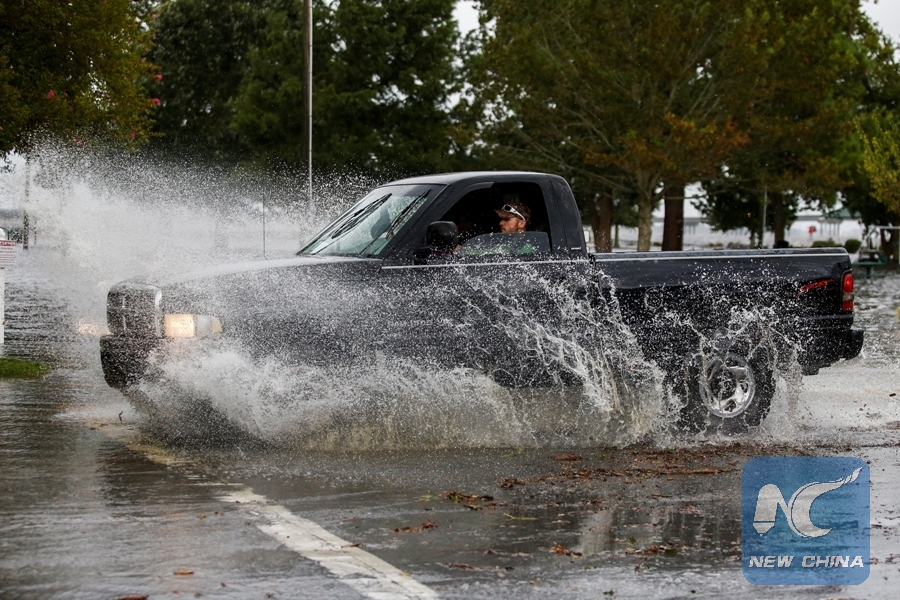 A man drives his car around the flooded Union Point Park Complex as the Hurricane Florence comes ashore in New Bern, North Carolina, the United States, Sept. 13, 2018. (REUTERS Photo)
A man drives his car around the flooded Union Point Park Complex as the Hurricane Florence comes ashore in New Bern, North Carolina, the United States, Sept. 13, 2018. (REUTERS Photo)
WASHINGTON, Sept. 13 (Xinhua) -- Hurricane Florence started to hammer U.S. East Coast on Thursday, with formidable wind, rain and storm surge.
DANGEROUS AS EVER
Though it was downgraded on Wednesday night to a Category 2 hurricane, U.S. meteorologists have repeatedly warned the storm is still very dangerous and destructive.
"Do not focus on the wind speed category of #Hurricane #Florence!" the National Hurricane Center tweeted. "Life-threatening storm surge flooding, catastrophic flash flooding and prolonged significant river flooding are still expected."
Storm surge of up to 13 feet will be "life threatening" and rainfall of up to 40 inches will mean "catastrophic" flooding, the National Hurricane Center warned.
The hurricane, whose wind field size is now larger than North Carolina and South Carolina combined, is expected to make landfall on the Carolinas early Friday. Winds are expected to be onshore in North Carolina late Thursday at more than 80 mph.
"The storm surge. This is the most dangerous part of the storm," said NBC News forecaster Al Roker, "Do not pay attention to the category. That's not the important thing."
Federal Emergency Management Agency (FEMA) administrator Brock Long warned at a press conference Thursday morning that inland flooding could be deadly and the cleanup will take time and patience.
"The infrastructure is going to break," Long said. "The power is going to go out. It could go out for a number of days, it could go out for weeks. It's very hard to say at this point."
"Don't play games with it. It's a big one", President Donald Trump said at the White House.
LAST MINUTE PREPARATIONS
On Thursday, nearly 600 flights were canceled with more than 500 already grounded for Friday, data from flight tracking site FlightAware.com showed. Operations at airports along the Carolina coastline have also been suspended.
Boeing evacuated several new 787-10 Dreamliner jets from its factory in North Charleston, South Carolina, flying them across the country to its main facility in northwestern state Washington, said a CNN report.
Home Depot and Lowe's, the two U.S. major hardware chains, said they sent around 1,000 trucks of generators, trash bags and bottled water and other items to their stores in the region as emergency response, according to local media reports.
In South Carolina, governor Henry McMaster said more than 300,000 people had fled the storm, urging residents living in low-lying areas to evacuate, even if they are not in a mandatory evacuation zone.
More than 1,600 people spent Tuesday night in 36 shelters across the Carolinas, and dozens of more shelters were opened Wednesday, local media reported.
On Thursday, Gregory Lusk, the adjutant general of the North Carolina National Guard, said 6,400 guardsmen were on active duty between North Carolina, South Carolina and Virginia.
The hurricane is also predicted to pass directly over two nuclear power plants in North Carolina, the Brunswick nuclear plant 30 miles south of Wilmington and the Shearon Harris nuclear plant in New Hill, a town farther inland. They are owned and operated by Duke Energy.
Both power plants have also been ordered to shut down their nuclear reactors 12 hours before the hurricane hits their region, Roger Hannah, a spokesman for the U.S. Nuclear Regulatory Commission, told Reuters. They have also prepared their backup diesel generators.
Governors of Georgia, South Carolina, North Carolina, Virginia and Maryland have declared a state of emergency ahead of the storm, joined by Washington D.C. mayor on Tuesday.
According to the U.S. National Weather Service, there are 5.25 million residents in areas under hurricane warnings or watches, and 4.9 million in places under tropical storm warnings or watches.

